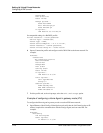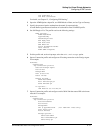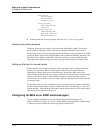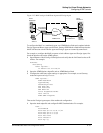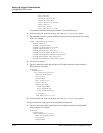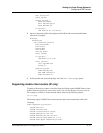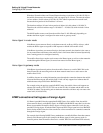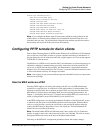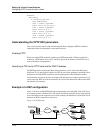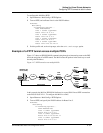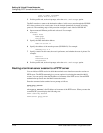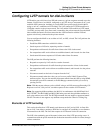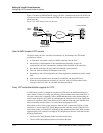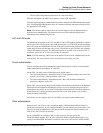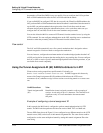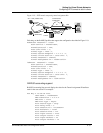
11-28 MAX 6000/3000 Network Configuration Guide
Setting Up Virtual Private Networks
Configuring PPTP tunnels for dial-in clients
Ethernet
Mod Config
L2 Tunneling Options...
PPTP Enabled=Yes
Line 1 tunnel type=PPTP
Route line 1=10.65.212.11
Line 2 tunnel type=None
Route line 2=0.0.0.0
Line 3 tunnel type=None
Route line 3=0.0.0.0
Line 4 tunnel type=None
Route line 4=0.0.0.0
Understanding the PPTP PAC parameters
This section provides some background information about configuring PPTP. For detailed
information about each parameter, see the MAX Reference.
Enabling PPTP
When you enable PPTP, the MAX can bring up a PPTP tunnel with a PNS and respond to a
request for a PPTP tunnel from a PNS. You must specify the IP address of the PNS in one or
more of the Route Line parameters.
Specifying a PRI line for PPTP calls and the PNS IP address
The PPTP parameters include four Route Line parameters, one for each of the MAX unit’s
WAN lines. If you specify the IP address of a PNS in one of these parameters, that WAN line is
dedicated to receiving PPTP connections and forwarding them to that destination address.
The IP address you specify must be accessible via IP, but there are no other restrictions on it. It
can be across the WAN or on the local network. If you leave the default null address, that WAN
line handles calls normally.
Example of a PAC configuration
Figure 11-6 shows an ISP POP MAX unit communicating across the WAN with an NT Server
at a customer premise. Windows 95 or NT clients dial into the local ISP and are routed directly
across the Internet to the corporate server. In this example, the MAX unit’s fourth WAN line is
dedicated to PPTP connections to that server.
Figure 11-6. PPTP tunnel
Windows NT
server (PNS)
PPTP tunnel
10.65.212.11
WAN
Modem
WAN
PAC
MAX
ISP
POP
Win95
Win95
Win95
Pipeline
ISDN
modem



